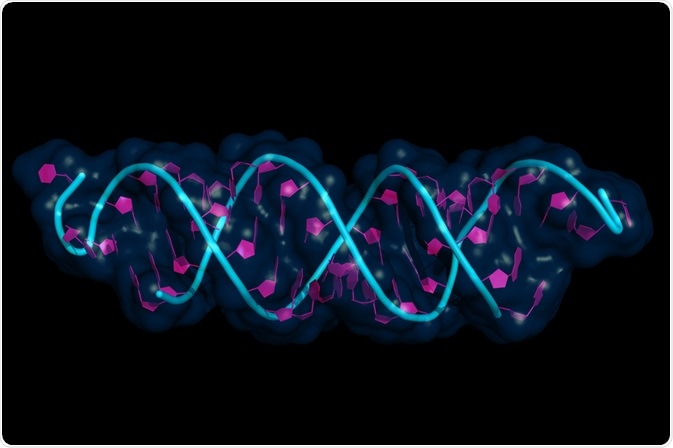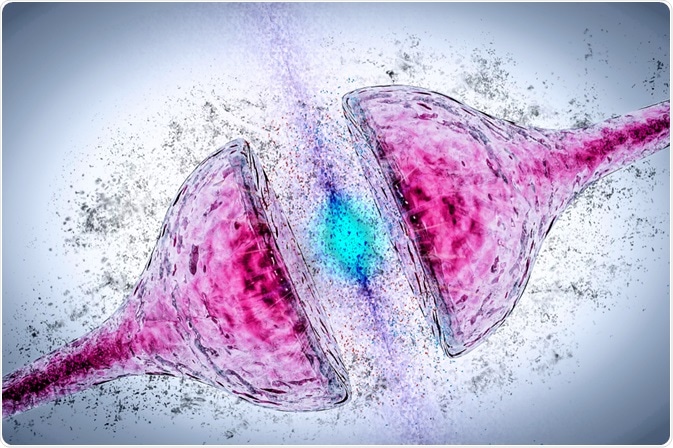Epigenetics, which translates to “above genetics”, is widely used to identify mechanisms that can change the expression of genes, without altering the genetic code itself.

Image Credit: petarg/Shutterstock.com
Epigenetic mechanisms, which mainly include DNA methylation and histone modifications, explain how gene–environmental interactions influence both neurobiology and behavior over the human lifespan.
Different extrinsic factors can change neural activity throughout an organism (starting from the embryo to adult or even during aging), such as exercise, diet, environmental factors, and stressors.
The central nervous system, and particularly the brain, is significantly affected and regulated by epigenetic factors.
Epigenetics has a significant role in the adaptive features of the central nervous system whether physiological such as embryonic development and aging or pathological (cancer and neurodegenerative disease) conditions. Epigenetic mechanisms help neurons to develop specific reactions activities, in response to intrinsic or extrinsic stimuli.
Epigenetic role during the early-life time
Epigenetic mechanisms, specifically DNA methylation, have been correlated to incidents exclusively seen in cellular development and differentiation, or cancer.
Yet, in 2004, Weaver and colleagues argued that the epigenome is sensitive to environmental effects beyond embryonic development. They found that histone modification and DNA methylation of the glucocorticoid receptor gene in the hippocampus of adult male rats were directly correlated to the type of maternal care which was given to them during their infancy.
Researchers found that rats received high care of their mothers such as licking, or grooming showed low levels of DNA methylation of the glucocorticoid receptor gene and vice versa.
The rats with low levels of DNA methylation of the glucocorticoid receptor gene showed a more moderate stress response and displayed less fear-like behavior. This clearly shows the critical role of epigenetics in neurobiology and behavior by infant-caregiver experience.
In 2008, a landmark study revealed the role of epigenetic mechanisms in the maladaptive outcomes of an adverse early-life environment. In this study, researchers reported that mothers subjected to gestational stress gave birth to adult males with marked changes in expression of the corticotropin-releasing factor, glucocorticoid receptor genes and a depressive-like phenotype such as anhedonia.
They found that prenatal stress exposure had remarkably decreased methylation of specific sites in the regulatory region of the corticotropin-releasing factor, which increased the expression of corticotropin-releasing factor gene and contributed to the depressive-like phenotype seen in the offspring. This study reveals how stressors that occurred during the pregnancy could lead to neurobiology alteration and depression.
Epigenetic role in adulthood
Ongoing researches showed that epigenetics not only has a leading role in programming neurobiology and behavior during early life but also plays a marked role in regulating and supporting neural and behavioral plasticity in adulthood.
Histone modification seems to have a role in mediating adult neurobiology and behavior. Researchers found that hippocampal histone acetylation and complex patterns of histone methylation increase during associative fear memory formation.
In the prefrontal cortex, histone acetylation has been linked to the extinction of conditioned fear. In cognitively impaired mice, the positive influence of environmental enrichment on the restoration of learning and memory ability has been demonstrated to involve increased acetylation of hippocampal and cortical histones.
Many studies have correlated the learning and memorizing ability of an adult animal with instant and temporary alteration in hippocampal DNA methylation. In 2020, Miller and colleagues reported longer-lived experience-induced alterations in cortical DNA methylation after the contextual fear condition.
Addiction or Cocaine-related behaviors were also linked to epigenetics. Cocaine administration was reported to significantly increase the level of striatal histone acetylation on two genes known to have an important role in cocaine-related behaviors, c-fos, and fosB.
Epigenetics may also clarify how adulthood stressors can change behavior and cognition. Histone modifications within the hippocampus are induced by the effect of the forced-swimming task. Histones are also affected by chronic social defeat stress.
An increase in suppressive histone methylation is correlated with the downregulation of hippocampal brain-derived neurotrophic factor mRNA induced by social defeat stress.
Abnormality or impairment in the regulation of epigenetic mechanisms is linked to cognitive dysfunction in different psychiatric and brain diseases. For instance, anomalous DNA methylation of the reelin and Gad1 genes could suggest malfunction of GABAergic neurons in schizophrenia, and modified GABA activity may be the reason for at least some of the clinical schizophrenia characters.

Image Credit: CI Photos/Shutterstock.com
In Alzheimer’s patients, researchers also reported aberrant DNA methylation and histone modification. In 2010, Keller and colleagues reported that altered DNA methylation could be implicated in impairment in the regulation of the brain-derived neurotrophic factor gene associated with suicidal behavior.
There is growing evidence that epigenetics does not only have a role during early-life time, but it also impacts neural and behavioral plasticity in adulthood.
Sources
- Keller, S., Sarchiapone, M., Zarrilli, F., Videtič, A., Ferraro, A., Carli, V., Sacchetti, S., Lembo, F., Angiolillo, A., Jovanovic, N. and Pisanti, F., 2010. Increased BDNF promoter methylation in the Wernicke area of suicide subjects. Archives of general psychiatry, 67(3), pp.258-267.
- Miller, C.A., Gavin, C.F., White, J.A., Parrish, R.R., Honasoge, A., Yancey, C.R., Rivera, I.M., Rubio, M.D., Rumbaugh, G. and Sweatt, J.D., 2010. Cortical DNA methylation maintains remote memory. Nature neuroscience, 13(6), pp.664-666.
- Molfese, D.L., 2011. Advancing neuroscience through epigenetics: molecular mechanisms of learning and memory. Developmental neuropsychology, 36(7), pp.810-827.
- Mueller, B.R. and Bale, T.L., 2008. Sex-specific programming of offspring emotionality after stress early in pregnancy. Journal of Neuroscience, 28(36), pp.9055-9065.
- Ortuño-Sahagún, D., Schliebs, R. and Pallàs, M., 2019. Epigenetic Mechanisms Regulating Neural Plasticity. Frontiers in cellular neuroscience, 13, p.118.
- Weaver, I.C., Cervoni, N., Champagne, F.A., D'Alessio, A.C., Sharma, S., Seckl, J.R., Dymov, S., Szyf, M. and Meaney, M.J., 2004. Epigenetic programming by maternal behavior. Nature neuroscience, 7(8), pp.847-854.
Further Reading